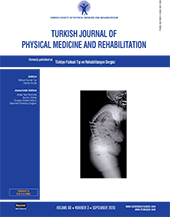Cardiometabolic risk parameters of individuals with lower extremity amputation: What is the effect of adherence to DASH diet and Mediterranean diet?
2 Department of Nutrition and Dietetics, Gülhane Faculty of Health Sciences, University of Health Sciences Turkey, Ankara, Turkey DOI : 10.5606/tftrd.2020.5988 Objectives: The aim of our study was to investigate the relationship between nutrition (adherence to Mediterranean Diet [MD] and Dietary Approaches to Stop Hypertension [DASH] diets) and cardiovascular disease risk factors in patients with traumatic lower limb amputation (LLA).
Patients and methods: A total of 35 male patients (mean age 36.9±9.3 years; range, 21 to 54 years) with unilateral traumatic LLA between April 2019 and November 2019 were included. Data including age, education status, clinical data, level of amputation, time of amputation, comorbidities, physical activities, medications including nutritional supplements were collected. Blood pressure and anthropometric measurements including weight, height, waist, hip, and upper median arm circumferences were measured. Three-day food records were evaluated to determine daily nutrient intake of each patient. The patients were divided into groups according to their diet scores.
Results: The DASH scores showed a moderate, negative correlation with the body mass index (BMI), hip circumference, waist circumference, waist-to-hip ratio, waist-to-height ratio, serum total cholesterol (TC), triglyceride (TG), and low-density lipoprotein cholesterol (LDL-C). The MD scores showed a moderate, negative correlation with the BMI, waist circumference, hip circumference, waist-to-height ratio, serum TC, TG, and LDL-C.
Conclusion: Patients with traumatic LLA should be monitored closely for accompanying conditions such as cardiovascular diseases, and it is necessary to encourage them for healthy nutrition habits.
Keywords : Cardiometabolic risk, dietary approaches to stop hypertension diet, mediterranean diet, traumatic lower limb amputation

















